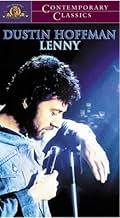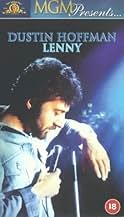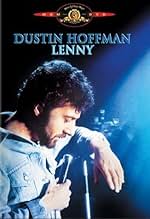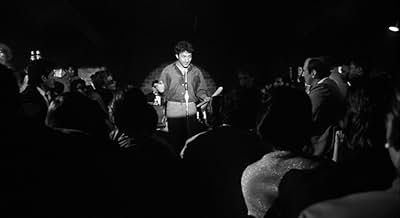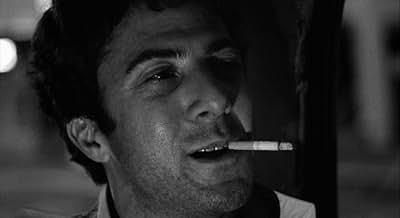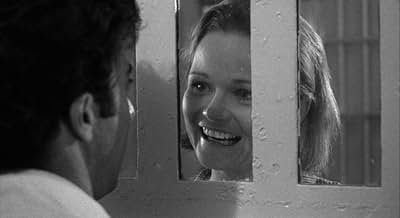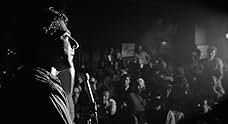A história do comediante Lenny Bruce dos anos 60, cujo estilo inovador, sem limites e comentários sociais eram muitas vezes considerados pelo estabelecimento como muito desavergonhados para ... Ler tudoA história do comediante Lenny Bruce dos anos 60, cujo estilo inovador, sem limites e comentários sociais eram muitas vezes considerados pelo estabelecimento como muito desavergonhados para o público.A história do comediante Lenny Bruce dos anos 60, cujo estilo inovador, sem limites e comentários sociais eram muitas vezes considerados pelo estabelecimento como muito desavergonhados para o público.
- Indicado a 6 Oscars
- 7 vitórias e 17 indicações no total
- Girl
- (as Kathie Witt)
- Hawaiian Judge
- (as Monroe Meyers)
Avaliações em destaque
And the use of black and white was great. The movie did give Lenny the appreciation that he deserved, mainly by showing his troubled personal life and his troubles with the law. The movie portrayed the trouble and basically harassment that Lenny went through when he voiced his observations of society, which were true, but weren't quite ready to be heard yet. The only fault (if at all) of the film is that it didn't quite show Lenny's genius in what he did. It definitely showed his potential but not quite his brilliance. But this might be because it was a biography of sorts of his life which included his personal and public life. I suppose if the movie just focused on his comedic talents; than his genius would have been obvious, but that wasn't the focus of the film. All in all this is an excellent movie in what it attempted to do. It accomplished what it set out to do and that's what counts.
**** (out of 4)
Bob Fosse's masterpiece takes a look at the short life of comic Lenny Bruce (Dustin Hoffman) who would die at the age of forty but not before breaking down certain doors for future comics. The film follows his rise up through the ranks thanks in large part to the controversy that followed him due to the nature of his act. I've always felt that LENNY was one of the best movies of the decade and even after all these years it's still a very sharp, at times funny but mostly sad look at a man who deserved much better than he ever got. There's no doubt in my mind that the film was like the light shining from above on both Fosse and Hoffman as the two were perfectly meant to bring this film to the screen and boy do they really deliver. Fosse's style here wouldn't work with most directors but the way he uses it to get to the emotion and power in the story is quite amazing. The film jumps back and forth through different periods of Bruce's life and the way Fosse uses this to build up the subject is something interesting to watch. Just take a look at a rather innocent scene where Bruce talks his wife into having a threesome with another woman. Just look at how the silence is used and the impact this has for this scene. Hoffman gives one of his greatest performances here, which is saying quite a bit considering how great he was during this period of his career. I thought he really did a remarkable job at not copying the real Lenny Bruce but instead taking him and forming him into this character. I thought Hoffman really gave an incredibly powerful and emotional performance and especially as Bruce begins to crack due to the pressures of the courts and the drugs. Valerie Perrine is also excellent in her role of Bruce's drug addicted wife. The B&W cinematography is some of the greatest you're ever going to see. This is certainly one of the most beautiful films you're ever going to see and especially the way the lighting is even in the simplest scenes. LENNY often gets beaten up by some critics because it's not 100% accurate but I've yet to see any bio pic that is. To me this is clearly one of the best movies of the decade and features one of the greatest performances you're going to see.
Made in a fairly familiar quasi-documentary style, 'Lenny' begins with 'present day' (i.e. 1974) interviews with the surviving characters from Lenny's life, cut with flashbacks to his 1950's beginnings as a 'traditional' comic, and 'late' live performances in his post-drug-bust days. As the film progresses and the narrative catches up with the interviews, the gaps between these segments 'close'. Clever use is made of some of Lenny's material, cutting from keywords or phrases in his bits, to events in his life with inspired or correlated to them.
All the same there is something a little dry and disappointing in the film's structure: almost as if it could have used a more conventional, linear narrative, like Milos Forman's tribute to Andy Kauffman, 'Man on the Moon' would use to such great effect 25 years later.
Ironically though, such a structure might have deprived of us of seeing more of Hoffman doing Lenny's bits 'live' on stage - and for me these were the highlights, which I wish had lasted longer, rather than flashing back to some past event after 30 seconds. As a big Lenny Bruce fan, I can only say that Hoffman's portrayal is almost supernatural. It's like he's channeling the guy. He has his mannerisms and improvisational style down perfectly. You would swear you were seeing these improvisations for the first time if you hadn't heard them already. In fact, Hoffman possibly even improves on Lenny's delivery in one small respect. Lenny had a penchant for the 'conversation' that would erupt in the middle of one of his bits, between two or more characters. Hoffman probably puts a bit more distinction between the characters than Lenny often did (quite often they would all just sound like Lenny, which was part of the magic, but never mind.) Over 30 years on, it's quite amazing to me that this film has become a relative obscurity in Dustin Hoffman's filmography. Frankly, though Hoffman has blown me away on various occasions, I don't ever remember being more blown away than this. And if you were to pick easy people to imitate, I doubt Lenny Bruce on stage would be high on many people's lists.
The film as a whole is good, but to witness Hoffman channeling Bruce, it's a must-see.
When seventies cinema was good, it was really, really good, and it is, at least acting-wise, only rarely rivaled in contemporary productions. As a character study and also as a snap shot of an era, 'Lenny' is essential viewing. 8 stars out of 10.
In case you're interested in more underrated masterpieces, here's some of my favorites:
imdb.com/list/ls070242495
Você sabia?
- CuriosidadesThe scene in which Lenny Bruce does his act in a raincoat, near the movie's end, came from a Lenny Bruce show that a student tape-recorded and sent to Dustin Hoffman. Bruce's lines are directly from the tape.
- Erros de gravaçãoDuring the movie's opening monologue, Lenny says that it's 1964 and then references Jerry Lewis's MDA Telethon, which debuted in 1966.
- Citações
Lenny Bruce: What's the worst thing you can say to anybody? ''Fuck you, mister!'' That's really weird, because if l wanted to hurt you, l should say, ''Unfuck you, mister'' Because ''fuck you'' is really nice, man.
- ConexõesFeatured in Precious Images (1986)
Principais escolhas
- How long is Lenny?Fornecido pela Alexa
Detalhes
Bilheteria
- Orçamento
- US$ 2.700.000 (estimativa)
- Tempo de duração
- 1 h 51 min(111 min)
- Cor
- Mixagem de som
- Proporção
- 1.85 : 1


